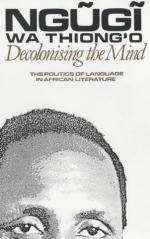
|
| Name: _________________________ | Period: ___________________ |
This test consists of 5 short answer questions, 10 short essay questions, and 1 (of 3) essay topics.
Short Answer Questions
1. With whom did Ngũgĩ wa Thiong’o collaborate in the drafting of the playscript for Ngaahika Ndeenda?
2. What does the Gĩkũyũ word "ngurukuhĩ" translate to in English?
3. What was the approximate population of Kamĩrĩĩthũ in 1975?
4. What word from the text refers to something relating to the theory of knowledge, especially with regard to its methods, validity, and scope?
5. In the Kamĩrĩĩthũ rehearsal and production for Ngaahika Ndeenda, the author says perfection was shown to be what?
Short Essay Questions
1. In his Introduction, Ngũgĩ wa Thiong’o states that the study of African realities has been too long seen in terms of tribes. What does he mean by this?
2. What role did drama play in pre-colonial Kenyan life?
3. What significant event in 1884 determined the fate of the future of Africa?
4. What is the basic plot of Ngaahika Ndeenda?
5. Who is David Diop and what was his perspective on language?
6. How did the literature of Africa change during the upheaval between imperialism and liberty?
7. What were Léopold Sédar Senghor's views on language?
8. How does the author describe the peasant's relationship to language in Chapter 1, Part VII?
9. What dramas was the author exposed to during his education?
10. What role did song and dance have in the original production of Ngaahika Ndeenda?
Essay Topics
Write an essay for ONE of the following topics:
Essay Topic 1
Discuss the publication and distribution of Caitaani Mũtharabainĩ. How many copies were originally ordered? How well did they sell and who bought them? How was the novel consumed by a largely illiterate audience?
Essay Topic 2
What impacts have colonization and imperialism had on the language of Kenyans and other Africans? How did colonial schools have a part in these impacts? What were the results of the import of European languages in Africa?
Essay Topic 3
What was the Berlin Conference of 1884? What world powers attended this conference? What was the goal of the conference? What outcomes came from the conference?
|
This section contains 803 words (approx. 3 pages at 300 words per page) |

|




